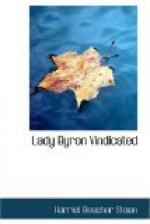Are the cries of the oppressed, the gasps of the dying, the last prayers of mothers,—are any words wrung like drops of blood from the human heart to be judged as literary efforts?
My fellow-countrymen of America, men of the press, I have done you one act of justice,—of all your bitter articles, I have read not one. I shall never be troubled in the future time by the remembrance of any unkind word you have said of me, for at this moment I recollect not one. I had such faith in you, such pride in my countrymen, as men with whom, above all others, the cause of woman was safe and sacred, that I was at first astonished and incredulous at what I heard of the course of the American press, and was silent, not merely from the impossibility of being heard, but from grief and shame. But reflection convinces me that you were, in many cases, acting from a misunderstanding of facts and through misguided honourable feeling; and I still feel courage, therefore, to ask from you a fair hearing. Now, as I have done you this justice, will you also do me the justice to hear me seriously and candidly?
What interest have you or I, my brother and my sister, in this short life of ours, to utter anything but the truth? Is not truth between man and man and between man and woman the foundation on which all things rest? Have you not, every individual of you, who must hereafter give an account yourself alone to God, an interest to know the exact truth in this matter, and a duty to perform as respects that truth? Hear me, then, while I tell you the position in which I stood, and what was my course in relation to it.
A shameless attack on my friend’s memory had appeared in the ‘Blackwood’ of July 1869, branding Lady Byron as the vilest of criminals, and recommending the Guiccioli book to a Christian public as interesting from the very fact that it was the avowed production of Lord Byron’s mistress. No efficient protest was made against this outrage in England, and Littell’s ‘Living Age’ reprinted the ‘Blackwood’ article, and the Harpers, the largest publishing house in America, perhaps in the world, re-published the book.
Its statements—with those of the ‘Blackwood,’ ‘Pall Mall Gazette,’ and other English periodicals—were being propagated through all the young reading and writing world of America. I was meeting them advertised in dailies, and made up into articles in magazines, and thus the generation of to-day, who had no means of judging Lady Byron but by these fables of her slanderers, were being foully deceived. The friends who knew her personally were a small select circle in England, whom death is every day reducing. They were few in number compared with the great world, and were silent. I saw these foul slanders crystallising into history uncontradicted by friends who knew her personally, who, firm in their own knowledge of her virtues and limited in view as aristocratic circles generally




